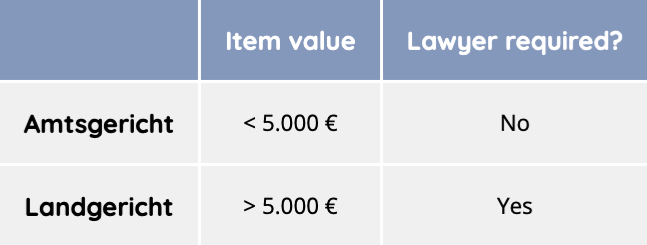Swiftcourt Dispute Assistance

Why you need to file a civil suit to proceed
If you and your counterparty find yourselves in a dispute, and you have used the Secure Escrow Payment service by Swiftcourt, you can file a Complaint with Swiftcourt.
Our Complaints service is a conflict resolution service to help buyers and sellers find solutions to disputes. Through this service, you can also request mediation from a support agent from Swiftcourt.
Although, as we don’t have the legal mandate to decide what party is right in a dispute, we can only suggest non-binding solutions to your dispute. It is then up to you and your counterparty to decide how you wish to proceed.
If no solution is found, and you don’t agree with the solution suggested by Swiftcourt, you can file a civil suit with the district court for a final resolution.
How to take it to court
The procedure to file a civil suit varies depending on your country. Below we have compiled the information based on your residential country.
If you want to take the dispute to court, you must first go through Forbrukertilsynet's mediation process. If the dispute cannot be resolved through mediation, they will offer you to bring the dispute before Forbrukerklageutvalget. Read more on Forbrukertilsynet's website.
Submit a civil suit to the district court by filling out a form on Sveriges Domstolar's website. The form can either be printed out and sent in by post, or filled out digitally.
Which court should the civil suit be filed to?
That depends on the value of your transaction and where your counterparty lives.
1. Choose a court that is responsible for the area where your counterparty lives
2. Depending on the value of the transaction, you should either file the suit with Amtsgericht or Landsgericht

How to file the civil suit?
If the value of your transaction is higher than 5.000€, the civil suit should be filed with the Landgericht. As this only can be done by a lawyer, you need to hire a lawyer to represent you and file the suit.
Read more about filing a suit with Landsgericht.
If the value of your transaction is lower than 5.000€, the civil suit should be filed with the Amtsgericht. This can be done in oral or written form.
If you file the suit orally, the people employed by the court will assist you
If you file the suit by writing, you need to make 3 copies. One for the judge, one for the person that is sued and one for the court archive
One can deliver a written civil suit physically to the district court or apply electronically. The correct approach always depends on the specific case. For more information you can read more here or visit your local district court.
Example story
Peter (i.e. the buyer) has signed a Swiftcourt contract with Anna (i.e. the seller) to buy her Tesla Model 3 for 45.000€. Peter and Anna decides to use the Secure Escrow Payment service that Swiftcourt offers.
When the buyer has paid the purchase sum into the secure escrow account, he meets up with the seller and picks up the vehicle.
On the buyer's way home, he notices that the touchscreen in the Tesla isn’t functioning properly, despite that the seller declared it did in their contract.
The buyer takes the Tesla to their nearest serviceman, to get a quote on the touchscreen. The serviceman informs the buyer that it will cost 1.500€ to replace the touchscreen.
The buyer files a Complaint with Swiftcourt and proposes that the seller will provide a price reduction of 1.500€ to cover the costs of replacing the touchscreen.
As the seller refuses to give a price reduction, they request mediation from Swiftcourt. A support agent from Swiftcourt listens carefully to both parties and suggests different solutions.
Despite this, a solution is not found. As both parties already have confirmed the handover of the vehicle, the purchase sum is paid out to the seller and there is nothing further Swiftcourt can do to assist.
The buyer is upset that the seller seemingly lied in the contract and won’t help to replace the touchscreen and therefore decides to file a civil suit against the seller.
The buyer files a civil suit with the district court, and now its up to the district court to rule in one parties favour.
What happens to the Purchase sum inside the escrow account?
If the purchase sum is held inside the escrow account when the conflict arises, we will initiate a payout to either the buyer or the seller dependant on the evidence provided.
Although, as we don’t have the legal mandate to decide what party is right in a dispute, the payout we initiate is not a legally binding decision. In case one party is unhappy with the outcome, they could file a civil suit with the district court for a final resolution.
Is it worth going to court?
Before deciding if you want to file a civil suit against your counterparty or not, you should take a few things into consideration:
For low priced items, going to court might not be worth it as the costs for going to court are high compared to the items value
In general, the losing party has to pay all costs in court
Tip: For low value items, a dunning letter from a lawyer can be very effective
